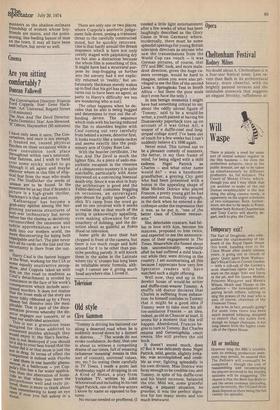Fringe Theatre
Ever since Eden
Gill Pyrah
There is an old story that the first thing Eve did when Adam came home at night was count his ribs, and ever since Eden writers have been preoccupied with the notion of fidelity and the unfathomable com plexities of human relationships. By now audiences (and surely actors) are tired of the constant rehearsal of intercourse on the stage; of the non-apocalyptic revelations of generation after generation of soul-baring authors each presenting his personal catalogue raisonne on the nature of love, lust, marriage and procreation. Between them the legions who have tramped over this old ground have produced scores of works whose contents range from lighthearted frolics in wife-swapping su burbia (viz 90 per cent of West End theatre), to exhaustive existential analyses of meaningful relationships (Sic) in Notting Hill Gate (viz 90 per cent of Fringe Theatre).
Fortunately for all at the Theatre Upstairs, E. A. Whitehead has again refused to be led down those parti cularly well-worn bridal paths. With an extraordinary insight, he has in the The Sea Anahor produced in eighty minutes a complete and awe-inspiringly accurate descrip tion of the emotional involvements of four ordinary young people: three in their early thirties and married, of whom two have at tained cynicism, the third is still partially deluded, and the Young fourth is plucking at the skirts',of womanhood and finding glamour' and 'real love' in adultery. The.play is set on a pier in Dublin Bay, and the group are over for a 'dirty weekend'. A fifth member of the party set off from Liverpool in a dinghy but has not arrived. On this simple frame Whitehead has hung a complex play with humour, subtlety and realism. The depressing motivations behind the social beha viour of the four are only exposed during moments of stress, which erupt from the accumulated te dium after hours on the pier awaiting the dinghy. When in holidaY mood they are brimming over with stouse wit and it is very, verY funny. The impeccablebilance comes as much from Jonathan Ha' les's natural direction as White head's craftsmanship, but it wag the author who observed, and so perfectly recorded, such human manners as the shallow-Intimate friendship of women whose boyfriends are mates, and the pointscoring, line-feeding banter of men on the town. It may all have been said before, but never so well.



































 Previous page
Previous page